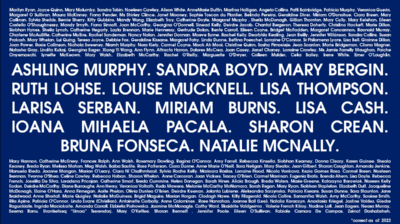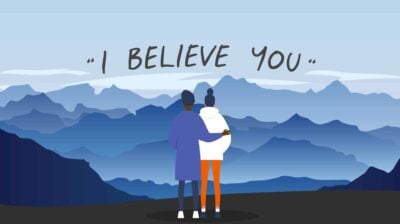What is sexual violence?
Everyone contributes to sexual violence being normalised in society, and we all have a shared responsibility to take action against it.


Sexual violence describes a wide spectrum of sexually violent behaviours that range from making sexist jokes and catcalling to sexual assault and rape. It can take many forms and can take place both between strangers and those who know each other well. Sexual violence is never the fault of the person who experiences the sexual violence.
Regardless of the nature of the sexually violent act or who is involved, this behaviour is never acceptable. Tolerance of any sexually violent act, no matter how commonplace across society they are, will only support and excuse other forms of sexual violence.
Sexual violence is embedded in our society. It influences our decisions, our conversations and our actions, even if we don’t realise it. As we all contribute to, experience and/or witness this normalisation of sexual violence, we have a shared responsibility to stand up against any form of sexual violence in our society.
This article covers the following topics:
- Understanding sexual violence
- Types of sexual violence
- What is the impact of sexual violence?
- What can I do if I experience sexual violence?
- Support services for victims of sexual violence
If you have experienced sexual violence, it’s important to know that you are not alone. Find out what you can do if you have been sexually assaulted.
If you have experienced sexual violence in any form, you can contact the National Sexual Violence Helpline for support at: 1800 778888
Understanding sexual violence
Sexual violence describes any act of a sexual nature which is unwanted. It can take place in any setting, including work, school, on the street and at home, and affects people of all genders, sexual orientation, and age. There are many forms of sexual violence, including rape, sexual assault, trafficking, sexual harassment and the taking or sharing sexual images without someone’s consent. People sometimes think of sexual violence as only sexual assault and rape, but it also includes behaviours like unwanted sexual comments, messages or content, being grabbed or touched without your consent, street harassment, and ‘banter’ or ‘jokes’ of that nature.
Any sexual act that a person did not consent to is considered an act of sexual violence. This is true regardless of the relationship between the people involved. For example, if the person responsible for the behaviour is an intimate partner, it is still sexual violence and is never okay.
Everyday instances of sexual violence
Catcalling, inappropriately brushing against someone and sending unwanted sexts are all examples of sexual violence. Because this kind of behaviour has become normalised in our society, it might not always be recognised or reported. It is important to know that these behaviours are harmful and make people feel uncomfortable or unsafe. All forms of sexual violence are unacceptable.
Some forms of sexual violence may appear subtle, but they impact how the person on the receiving end will respond to experiences later in life. The fact that these subtle acts can be dismissed as “normal” or “just a bit of fun” might lead people to doubt their own feelings and experiences, or even blame themselves, when they experience sexual violence. If sexually violent behaviours are considered normal and acceptable in their society and social circles, those impacted may come to believe that they are the problem, rather than the behaviour.
Types of sexual violence
Sexual violence can take many forms and can happen anywhere, including online, at home, school, work, with friends, and in public.
Sexual Harassment
Sexual harassment is a broad term which describes any unwanted verbal, non-verbal or physical conduct of a sexual nature. Examples include:
- Requests for sexual favours
- Deliberate touching, leaning over, brushing up against and/or cornering without a person’s consent
- Unwanted sexual gestures
- Unwanted pressure for dates
- Exposing someone to sexual content such as messages, images or other content without first getting consent
- Sexual comments
- Catcalls and whistles
- Unwanted sexual teasing, jokes, remarks and questions
- Unwanted staring or leering at somebody
- Asking personal questions about a person’s sex life and history
- Spreading rumours of a sexual nature
- Sharing personal details of a sexual nature about someone
- Someone exposing themselves
- Touching oneself sexually around another person
- Unwanted letters, telephone calls, messages, or other materials of a sexual nature
Sexual harassment can often be very subtle. Considering this and its normalisation in society, the person experiencing it may not always recognise it as harassment. Although the ways that people experience sexual harassment can be different, what they hold in common is that this behaviour was not consented to or welcomed by the person experiencing it.
It’s possible that you will experience one of these acts and not feel harassed by it. For example, someone may send you a sexual message that you enjoy receiving. However, if you did not offer consent before receiving the message, it is still considered harassment, regardless of how you feel after receiving it.
Read more about what to do if you experience sexual harassment.
Sexual Assault
Sexual assault refers to any non-consensual act of sexual violence that is physical in nature. Forms include unwanted touching and kissing, groping or being forced to touch somebody in sexual ways.
Stealthing
Removing a condom during sex without the other person’s knowledge and consent is known as stealthing. According to Irish law, a person does not consent to a sexual act if they are ‘mistaken as to the nature and purpose of the act’. Therefore, if a person consented to protected sex and is unaware that their partner has removed or not worn a condom, they have not truly consented to the act.
Sexual Coercion
If somebody tricks, threatens, guilts or blackmails you in a non-physical way into having unwanted sexual activity with them, it is known as sexual coercion. Somebody may sexually coerce you by convincing you that you owe them sex, making you feel guilty if you don’t have sex, or by promising you things in exchange for sex. Saying “I will love you if you have sex with me” or “if you loved me you would have sex with me” are examples of this. Sexual coercion can take place in person, or using technology. For example, you can be coerced into sending somebody intimate photographs. Saying “If you really loved me, you would send them to me” is an example of how this kind of coercion can play out.
As consent given under sexual coercion is not freely given, it does not count as consent. Considering this, any sexual activity that takes place as a result of sexual coercion is assault.
Sexual Abuse
Sexual abuse usually refers to a pattern of unwanted sexual acts carried out by one person against another. It is often carried out by a person in a position of trust or authority. A person who sexually abuses somebody may first attempt to gain their trust with the intention of later manipulating, exploiting and abusing them. This is known as grooming. An abuser will often convince their victim to keep the behaviour a secret.
Rape
If someone forces you to have sex with them without your consent, it is rape. This is true regardless of whether you are in a relationship with that person or not. In fact, forced sex by an intimate partner is a common form of sexual violence. Attempted rape is also a form of sexual violence.
Sex trafficking
When someone is forced or coerced to take part in sex acts in exchange for some form of payment, it is known as trafficking. This can include forced sex work, forced pornography and other sexual activity done with the promise of money, food, shelter and other items of value in return. It can also include threats against your safety if you don’t go along with it.
It is important to note that any sexual activity carried out with a minor in exchange for any form of payment, even without force, fraud, or coercion, is considered trafficking.
There are many types of sexual violence, not limited to those described above. If somebody has involved you in a sexual act without your consent, this is considered sexual violence and is not acceptable.
Consent and different situations
Before having sex or being involved in anything that is sexual in nature, consent must be given by everyone involved. Consent is an agreement between people that everyone is happy to take part in the act. Consent can be expressed verbally or through body language. However, as everyone can interpret body language differently, it is best to always ask for clear verbal consent too. Remember, consent must always be enthusiastic, conscious and voluntary.
There are certain situations in which consent cannot be considered true consent. Read more about the meaning of consent.
Consent and people under 17
It is important to remember that the sexual age of consent in Ireland is 17. This means that anyone under this age cannot legally offer their consent, no matter what the act is or what they say.
Consent and power
If a person holds a powerful position over another, it is very possible that consent cannot be freely-given. For example, if your boss sends you an email that is sexual in nature, you might feel pressured into offering consent out of fear that you might otherwise lose your job. This is not true consent. For anyone in a position of authority i.e. coach, boss etc., the age of consent rises to 18.
What is the impact of sexual violence?
Experiencing sexual violence can have a significant impact on a person’s life. Sexual violence can have both physical and psychological consequences, and the trauma of that experience can affect the person for many years.
Psychological effects of sexual violence
Experiencing sexual violence can also have a significant impact on your mental health, including:
- Difficulties with trust or forming or maintaining relationships
- Depression
- Anxiety
- Suicidal thoughts
- Self-harm
- Post-Traumatic Stress Disorder (PTSD)
Physical effects of sexual violence
The physical effects can include:
- Bruising
- Injuries to the genital area
- Gastrointestinal (digestive) problems
- Cardiovascular (heart) problems
- Sexual health problems including STIs
- Discomfort when in sexual or romantic relationships in future
Trying to cope
Those who have experienced sexual violence will of course struggle to cope with what has happened and the feelings and symptoms that emerge. In an effort to cope, people who have experienced violence might develop an unhealthy relationship to drugs or alcohol or other substances in an effort to dull the pain of what happened. This may or may not be a conscious choice.
Impacting a person’s quality of life
Trauma describes the immediate and long-term severe emotional and psychological distress that someone may experience in response to a disturbing or distressing event. The trauma resulting from sexual violence can greatly reduce someone’s quality of life and affect their ability to maintain a job, an education and/or their relationships. Coping and completing everyday tasks after experiencing sexual violence can be challenging.
The risk of repeat experiences
Sexual violence is connected to other forms of violence in later life. For example, those who experience it as a young person are more likely to experience intimate partner violence in adulthood.
What can I do if I experience sexual violence?
Remember, if you have experienced sexual violence, you are not alone. While efforts to end sexual violence in our society continue to grow, sexual violence is unfortunately still very common, and most of us will have stories to share. There is shared strength in our voices and in our healing. People of all ages and walks of life have gone through sexual violence, and recovery and healing is more than possible. We can all take steps to heal ourselves, each other and the world from sexually violent behaviour.
Talk to someone
If you have experienced any form of sexual violence, it is very important to know that it is not your fault. There is never an excuse for sexual violence, and you should not feel ashamed or guilty for having had this experience. There is no behaviour that makes sexual violence an acceptable act.
Anyone who shares their experience of sexual violence should be heard and believed. You may fear that your experience is ‘not serious enough’ or that others won’t believe you. But it’s very important that you know that what you have been through matters, and that you deserve support. Every experience of sexual violence is unacceptable and must be taken seriously.
If you have experienced sexual violence, it is important to tell somebody about it. This can feel scary at first, but can make all the difference in how you feel and are able to move forward. You might consider sharing about what happened with a trusted friend or family member. If the sexual violence is taking place at work, your workplace should have a Dignity at Work Policy which will suggest who you can approach. You can also approach the Irish Human Rights and Equality Commission for information and advice. If it is happening at school, you can consider speaking with a school guidance counsellor or trusted teacher. You might experience sexual violence while taking public transport. If so, you can report the incident directly to the driver or by contacting their customer support line.
No matter where you experience sexual violence, it is important to try to find somebody you can trust to speak with about the issue. If you are unsure who to approach about this, or if you want additional support, you can get in touch with one of the support services listed at the end of this article.
Remember, when it comes to who to tell, how to tell them and what to share, only you can decide what is best. You do not have to share every detail. If you do decide to open up to someone, perhaps you can start the conversation by setting some ground rules. You can say something like: “I’d like to tell you about something that’s difficult for me to talk about and it would mean a lot to me if you would just listen to what I have to say.”
Report the behaviour
If you have recently experienced rape, sexual assault or any type of sexual violence, online or in person, you have the right to report this to the Gardaí. In the case of a recent rape or sexual assault, you can call emergency numbers such as 999 or 112 or contact your local Garda station. You can also contact a Rape Crisis Centre and someone can accompany you to report to the Gardaí. This can often be done in the centre instead of the Garda station.
When you make a report to the Gardaí about a sexual crime, they will offer to take you to a Sexual Assault Treatment Unit (SATU). You can bring a friend or a family member with you if you wish, or the Rape Crisis Centre can arrange for someone to accompany you. However, you can go to a SATU even if you do not wish to report your experience. You can make an appointment with the SATU directly and, if this is the case, a Rape Crisis Centre support worker will be there for your appointment.
A SATU is a safe place for anyone who has experienced any form of sexual contact that was not consented to. At a SATU, you can receive medical treatment and emotional support. You might also choose to get a forensic examination to collect evidence following the incident. This is available to you, even if you do not want to report the incident, or if you are unsure whether you want to. All SATU care is free.
To report a historic rape, sexual assault or child sexual abuse, you can contact your local station and arrange a time to meet with a specially-trained Garda to discuss making a report.
Some people may find the reporting process difficult and traumatic and be unsure about what will be asked of them if they report a sexual crime. This is completely understandable and you are not alone. A representative from your local Rape Crisis Centre can walk you through the process and offer you information and non-judgmental support along the way.
Counselling
Sexual violence can affect your physical, psychological and emotional health, as well as every other area of your life. Speaking with a counsellor with experience in working with those who have gone through sexual violence may help you to process the experience and work through any difficulties you’re experiencing as a result.
Overcoming sexual violence may be a difficult process, and that’s ok. It is important to give yourself the time and care that you need to get through this difficult experience. Remember, you are not alone. Many others have experienced sexual violence and, with time and plenty of support, have come out the other side. Read more about other young people who have experienced sexual violence:
- I was in a sexually violent relationship in college – here’s what I think you should know
- I was sent unwanted nudes on Snapchat when I was 13
- 6 ways to support someone who has been sexually assaulted
Support services for sexual violence
If you are not comfortable speaking with somebody you know about your experience, or if you want additional support, there are many free and non-judgmental services that can support you.
- National Sexual Violence Helpline (run by the Dublin Rape Crisis Centre): 1800 778888
- Dublin Rape Crisis Centre: 01 661 4911
- Galway Rape Crisis Centre: 091 564 800, 1800 355 355
- KASA (Kilkenny Rape Crisis Centre): 056 77 51555, 1800 478 478
- Mayo Rape Crisis Centre: 094 90 25657, 1800 234 900
- Rape Crisis Network Ireland: 01 865 6954
- Sexual Assault Treatment Unit (SATU): 01 817 1736
- Tipperary Rape Crisis Centre & Counselling Centre: 1800 340 340, 052 6127677
- Womens Aid: 1800 341 900, 01 6788858
- Kerry Rape & Sexual Abuse Centre: 1800 633 333
Feeling overwhelmed and want to talk to someone?
- Get anonymous support 24/7 with our text message support service
- Connect with a trained volunteer who will listen to you, and help you to move forward feeling better
- Whatsapp us now or free-text SPUNOUT to 50808 to begin.
- Find out more about our text message support service
If you are a customer of the 48 or An Post network or cannot get through using the ‘50808’ short code please text HELLO to 086 1800 280 (standard message rates may apply). Some smaller networks do not support short codes like ‘50808’.






